|
|
|
Sort Order |
|
|
|
Items / Page
|
|
|
|
|
|
|
| Srl | Item |
| 1 |
ID:
095259


|
|
|
|
|
| Publication |
2009.
|
| Summary/Abstract |
The article seeks to trace the development of International Relations Theory (IRT) in China since 1978. Based on the data collected from five major International Relations (IR) journals published in China as well as a series of translated Western classics and important IRT works by Chinese scholars, the article concludes that two parallel processes are at work in China over the last thirty years. One is a tenacious learning process aimed at knowledge acquirement and generation. It is primarily a process of learning from the West, especially the US, through which IR has developed as an independent academic discipline in China. The resulting triangular competition for influence among the three imported schools of IRT, that is, Realism, Liberalism and Constructivism coincides with the internal debates on China's rise and integration into the international community. The other is a process of developing a Chinese school of IRT. Dissatisfied with the dominance of Western theoretical discourse in the Chinese context, scholars in China have been trying to bring Chinese thoughts back in and establish a distinctly Chinese perspective on IRT.
|
|
|
|
|
|
|
|
|
|
|
|
|
|
|
|
| 2 |
ID:
095258


|
|
|
|
|
| Publication |
2009.
|
| Summary/Abstract |
The article seeks to do an audit of the state of International Relations theory (IRT) in India. It examines three facets of IRT in this connection. The first relates to the possibility of a tradition of thinking on issues of universal theoretical significance. The second pertains to an exploration of scholarly reflection on an important principle of Indian foreign policy, namely, non-alignment and the limits of theorizing it. The final facet examines the concerns that inform theorization by Indian scholars since the 1990s. In regard to the first facet, the article argues that there exists an Indian tradition of thinking on issues of order, justice and cosmopolitanism, even though it may not have been expressed in the language of IRT. With regard to non-alignment, the article argues that while it did not result in broader theoretical formulations, it raised a number of first order issues for further theorizing. Finally, it suggests that recent IRT invocations by Indian scholars reflect a more receptive conjuncture for such work, both in terms of India's own changing stature in the world system as well as an acknowledgement of more eclectic methods and possibilities in the broader world of the social sciences
|
|
|
|
|
|
|
|
|
|
|
|
|
|
|
|
| 3 |
ID:
095261
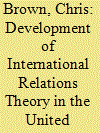

|
|
|
|
|
| Publication |
2009.
|
| Summary/Abstract |
British International Relations Theory (IRT) is distinguished by a concern with institutions and norms, and by an emphasis on history, philosophy and law rather than the formal methods of the social sciences. In both respects, but especially the latter, it differs from American IRT. The origins of British IRT are traced and the importance of the 'English School' is stressed partly because of the work it stimulates but also because of its role as a brand, which helps to establish the independence of British International Relations (IR) from the otherwise dominant American IR. Along with the English School scholarship (pluralist and solidarist), work on Political Theory and IR, and Critical Theory, including Critical Security Studies, are the major areas where contemporary British IRT is located. The article argues that this trend is likely to persist, but the generally critical approach taken to social scientific theorizing may be changing, with the increasing importance of historical sociology and critical realist work. It may also be the case that the privileged status of IRT in British IR may be under challenge
|
|
|
|
|
|
|
|
|
|
|
|
|
|
|
|
| 4 |
ID:
095252
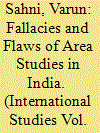

|
|
|
|
|
| Publication |
2009.
|
| Summary/Abstract |
Area studies programmes were established in Indian universities in two waves. The first wave emanated from an individual initiative of Prime Minister Jawaharlal Nehru in 1955 and the second from a committee set up by the University Grants Commission (UGC) in April 1963, soon after India's military defeat at the hands of China in 1962. While a large number of area studies programmes now exist in Indian universities, they have, from their earliest days, been handicapped by four conceptual fallacies and nine operational flaws. The fallacies are related to the subject matter, disciplinary focus, terms of reference and policy relevance, and the flaws are-the absence of theory, lack of multidisciplinary perspectives, analyses that are based on macro-level research, scarce fieldwork, deficiencies in language skills, lack of quantitative research projects, event-driven research agendas, predominance of secondary sources in research, and taught courses which are too broad in their formulation and too narrow in their subject matter. Each fallacy is fundamental; the flaws, taken together, have been fatal for the area studies programmes in India. The article ends with seven suggestions on how these programmes could be revitalized.
|
|
|
|
|
|
|
|
|
|
|
|
|
|
|
|
| 5 |
ID:
095256
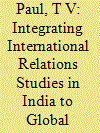

|
|
|
|
|
| Publication |
2009.
|
| Summary/Abstract |
The article makes a case for an intense engagement of international relations (IR) scholars in India with the global IR community, especially those specializing in IR theory. While India has increasingly been integrating itself in global economic and political orders, its IR scholar-ship is yet to get international recognition. This article outlines the structural and domestic causes for the relative absence of theoretical works in IR in India while emphasizing the need for rigorous theory-driven and theory-informed scholarship. It concludes by making eight recommendations for linking IR in India with the global IR scholarship, and offers specific areas where Indian scholars can contribute to puzzle and paradigm-driven IR scholarship.
|
|
|
|
|
|
|
|
|
|
|
|
|
|
|
|
| 6 |
ID:
095260


|
|
|
|
|
| Publication |
2009.
|
| Summary/Abstract |
The study of international relations (IR) is a worldwide pursuit with each country having its own theoretical orientations, preoccupations and debates. Beginning in the early twentieth century, the US created its own scholarly traditions of IR. Eventually, IR became an American social science with the US becoming the epicentre for a worldwide IR community engaged in a set of research programmes and theoretical debates. The discipline of IR emerged in the US at a time when it was the world's most powerful state and a liberal great power caught in a struggle with illiberal rivals. This context ensured that the American theoretical debates would be built around both power and liberal ideals. Over the decades, the two grand projects of realism and liberalism struggled to define the agenda of IR in the US. These traditions have evolved as they attempted to make sense of contemporary developments, speak to strategic position of the US and its foreign policy, as well as deal with the changing fashions and standards of social science. The rationalist formulations of realism and liberalism sparked reactions and constructivism has arisen to offer counterpoints to the rational choice theory.
|
|
|
|
|
|
|
|
|
|
|
|
|
|
|
|
| 7 |
ID:
095253


|
|
|
|
|
| Publication |
2009.
|
| Summary/Abstract |
Although the Indian International Relations (IR) community has been actively engaged in self-reflection, this has not translated into greater contribution at the international level. Part of the answer lies in the way IR in India has grown-institutionally, pedagogically, academically and as a research activity. The article seeks to assess the strengths and weaknesses of IR teaching and research in India on the basis of three parameters, that is, the papers taught in the M.A. programmes, the themes of research at the doctoral level and publications by IR scholars in select journals. On the basis of the weaknesses identified, the article offers some recommendations, which the IR community in India can adopt
|
|
|
|
|
|
|
|
|
|
|
|
|
|
|
|
| 8 |
ID:
095255
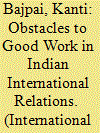

|
|
|
|
|
| Publication |
2009.
|
| Summary/Abstract |
This article suggests that, from 1947 to the late 1980s, Indian International Relations (IIR) led the developing world and certainly Asian IR. Since then, China, Korea and Japan seem to have taken the lead. The article defines the nature of 'good work' as 'good published work' and argues that there are five key obstacles to better published work in IIR: the neglect of theory; the failure to define a series of animating puzzles, problematiques and problem-solving agendas; the lack of methodological training; the quality of teaching; and the mismanagement of professional life. Three reasons are advanced for the origins and persistence of these obstacles: post-colonial parochialism; the influence of the formative moment of the field in India; and the relationship of Political Science/IR to the Indian state. The article concludes that the remedies are primarily in the hands of Indian scholars and not with the government
|
|
|
|
|
|
|
|
|
|
|
|
|
|
|
|
| 9 |
ID:
095257


|
|
|
|
|
| Publication |
2009.
|
| Summary/Abstract |
The article examines the reasons for the absence of effective but informal networks in India that help make and remake a nation's foreign policy, generate domestic political consensus and win international support. As a rising India reconstructs its foreign policy, a small proto-network that defines its core principles is beginning to emerge. A foreign policy vanguard, however, is no substitute to a more broadly based and deeply rooted structure of decision making. As the new foreign policy network evolves, the International Relations (IR) community can claim its legitimate role in shaping India's new foreign policy. By shedding its old conformist trap, joining the vigorous public square at home and reconnecting with the world, India's IR community can set a new foreign policy direction for the nation and offer course corrections when needed
|
|
|
|
|
|
|
|
|
|
|
|
|
|
|
|
| 10 |
ID:
095254
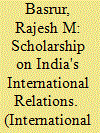

|
|
|
|
|
| Publication |
2009.
|
| Summary/Abstract |
An assessment of scholarship on India's International Relations (IIR) shows some significant weaknesses. At the global level, the discipline has not kept pace with rising interest in India. There is an appreciable degree of theoretical content in IIR, but it is relatively narrow in range. At the Asian level, interest in IIR is weak and, with exceptions, lacks engagement with theory as well as breadth of scope. In India, the discipline exhibits a wider spread but low-level theoretical content and relative isolation. Taken as a whole, the field needs greater creativity, theoretical depth and breadth of scope. The article concludes with a brief assessment of the reasons for these shortcomings and identifies the pathway to develop IR in India as a more vibrant discipline
|
|
|
|
|
|
|
|
|
|
|
|
|
|
|
|
| 11 |
ID:
095251


|
|
|
|
|
| Publication |
2009.
|
| Summary/Abstract |
The principal objectives of this article are to describe the current state of International Studies (IS) in India, to analyze the reasons for its lack of robustness and the factors responsible for the absence of a vibrant scholarly community and, finally, to suggest a few remedial measures. The lack of the growth of IS is attributable to many factors- systemic, institutional, disciplinary and leadership-related. In many ways, the crisis in IS is only a part of the larger crises affecting Indian Higher Education. IS in India needs better leadership, clear direction and urgent reform.
|
|
|
|
|
|
|
|
|
|
|
|
|
|
|
|
| 12 |
ID:
095250


|
|
|
|
|
| Publication |
2009.
|
| Summary/Abstract |
This report takes stock of the state of the field of international studies in India and recommends a vision and measures to strengthen the field and make it equal to those in leading institutions and programmes around the world. The ultimate goals of the measures recommended in the report are to:
a. make India a leading centre of knowledge and education in international studies;
b. produce a substantive pool of Indian scholars doing cutting-edge work that contributes to the production and accumulation of knowledge;
c. produce first-rate graduates to meet the demands and opportunities arising from the modernization and rise of India in a changing world; and
d. ensure that Indian IS scholarship contributes to increasing the knowledge base on India's international role as a responsible power fostering peace, security, good governance, economic development and resolution of a wide range of problems in its immediate region and the world.
The vision, measures and strategies here would reform and build on existing institutions as well as create new ones by drawing on the best practices in leading institutions in India and other countries
|
|
|
|
|
|
|
|
|
|
|
|
|
|
|
|
|
|
|
|
|